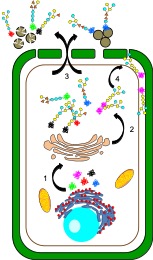E. Sánchez-Elordi, R. Contreras, R. de Armas, M.C. Benito, R. Santiago, C. Vicente, M.E. Legaz
Defense proteins from sugarcane studied by conventional biochemical techniques, genomics and proteomics: An overview.
Am. J. Plant Biol., 5: 32-39, 2020
DOI: 10.11648/j.ajpb.20200503.11
RESUMEN
Sugarcane is a C4 plant from the NADP-ME family, which performs a double photosynthetic carboxylation. It is a plant specialized in accumulating and storing large amounts of sucrose in the parenchymatous cells of its stalks. Perhaps because of these characteristics, this species shows to be extremely sensitive to a large number of diseases caused by viruses, bacteria, phytoplasmas, fungi, insects and nematodes, as well as to various abiotic stresses. A large number of varieties and cultivars resistant to many of these diseases have been achieved through conventional plant breeding techniques and also through biotechnological applications. In addition to this, the ability of the plant itself to produce pathogen resistance factors has been a field of research that has provided excellent weapons to combat crop-destroying pests This review describes those proteins that are synthesized by the plant as resistance factors against different diseases from the point of view of conventional biochemistry and also with the tools that modern genomics and proteomics provide. Special emphasis has been placed on the study of those proteins aimed at increasing the physical resistance of the plant that hinders the entry of the pathogen as well as those proteins related to the synthesis of bioactive phenols, polysaccharide hydrolysis enzymes, bacteriocins, oxygenases, oxidases and oxido-reductases.
